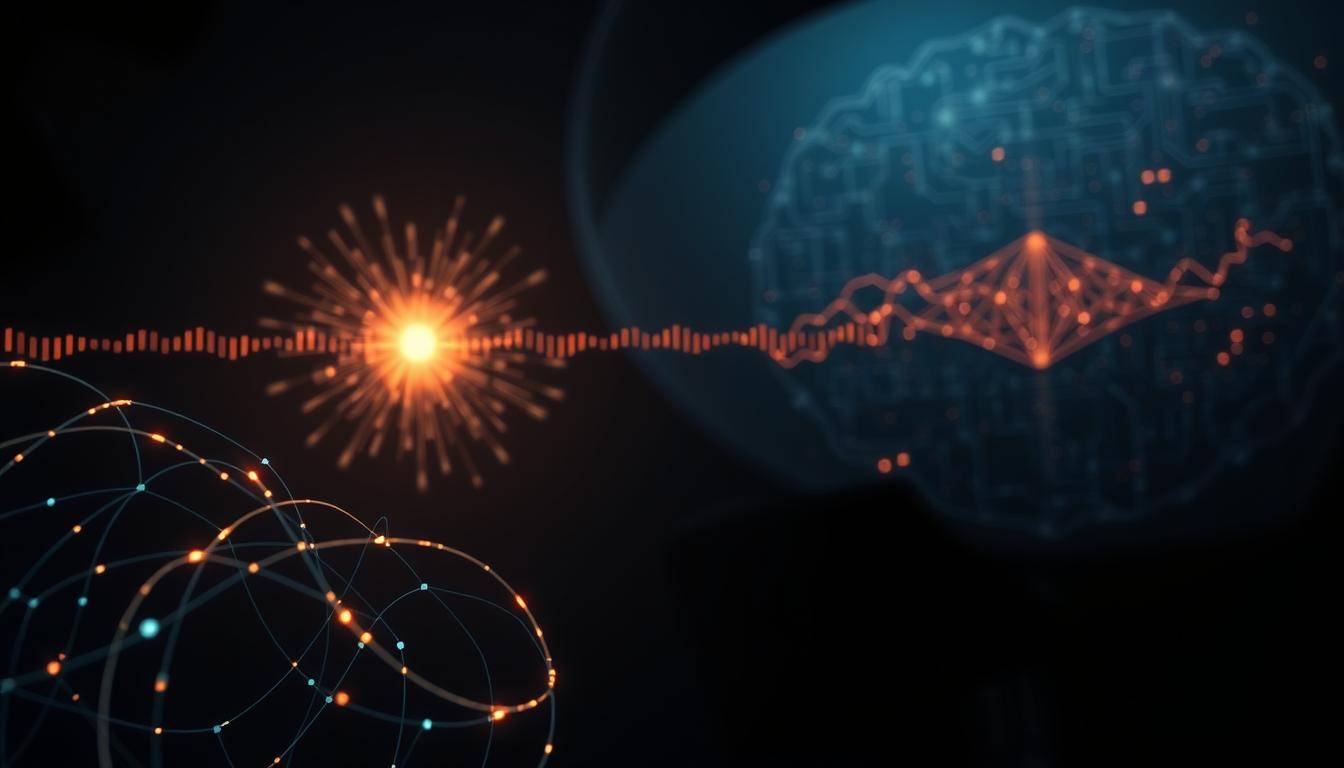“Until you make the unconscious conscious, it will direct your life—and you will call it fate.” Carl Jung’s iconic words capture the urgency of understanding the hidden forces shaping our lives. Over 80% of daily decisions stem from automatic patterns stored in the mind—patterns often rooted in outdated programming that limits potential.
These invisible scripts influence careers, relationships, and even health. Yet research shows that with deliberate effort, anyone can rewrite them. Neuroscientists confirm that the brain’s neuroplasticity allows new neural pathways to form—meaning old mental habits can be replaced. This isn’t wishful thinking; it’s a science-backed path to reclaiming control over thoughts and actions.
The process begins with awareness. By identifying limiting narratives and applying structured methods—like the five-step framework in this guide—readers can shift from passive acceptance to active creation. Techniques such as visualization, affirmation reframing, and targeted reprogramming bridge the gap between current realities and desired outcomes.
This article distills insights from psychology, neuroscience, and mindfulness practices into actionable strategies. Whether struggling with self-doubt or seeking greater fulfillment, these steps offer a roadmap. Progress demands consistency, but even small daily efforts compound into transformative results.
Key Takeaways
- Over 80% of daily behaviors stem from automatic mental patterns.
- Neuroplasticity enables rewiring of long-standing thought habits.
- A five-step framework (Decide, Commit, Resolve, Act, Sustain) drives lasting change.
- Science-backed methods like visualization amplify reprogramming efforts.
- Daily practice bridges the gap between current habits and desired outcomes.
Understanding the Subconscious Mind
Consider how effortlessly you tie your shoes or recall a favorite song lyric. These routines operate through mental processes working beneath your awareness—a hidden force directing 95% of cognitive activity according to neuroscience studies.

What Is the Subconscious Mind?
The conscious mind handles active decisions, like choosing what to eat for lunch. In contrast, the subconscious operates like an autopilot—managing ingrained habits and emotional responses. Think of it as a storage unit for everything you’ve learned, felt, or experienced. Unlike the unconscious (which governs involuntary functions like breathing), the subconscious can be accessed and reshaped with intention.
How It Shapes Our Daily Life
Learning to play guitar illustrates this perfectly. At first, finger placements require intense focus. With practice, chords flow naturally—your subconscious mind has mastered the skill. This same process applies to driving routes, speech patterns, and even self-perception.
Environmental cues constantly feed the brain. A 2022 Stanford study found people make 35,000 micro-decisions daily—most filtered through subconscious biases formed over years. These mental shortcuts save energy but can reinforce limiting patterns.
By understanding this hidden landscape, you gain leverage. Just as musicians refine their craft through repetition, targeted practices like visualization and affirmation alignment allow gradual rewiring. The mind’s adaptability isn’t theoretical—it’s a tool waiting to be used.
Identifying Deep-Seated Limiting Beliefs
Picture a tree with roots hidden beneath the soil—what grows above ground depends entirely on what lies below. Similarly, invisible mental frameworks developed in childhood shape decisions, reactions, and self-perception. These silent architects of behavior often operate unnoticed, directing 70% of emotional responses according to UCLA research.

Recognizing Core Beliefs
Core beliefs act like mental filters—formed through repeated experiences before age seven. A child who hears “money causes problems” might internalize “wealth brings unhappiness.” These convictions solidify into automatic thought patterns, surfacing as phrases like “I’m not leadership material” or “conflict always ends badly.”
Journaling reveals these hidden scripts. When frustration arises during teamwork, pause and ask: “What assumption is driving this reaction?” Childhood lessons about authority or fairness often resurface in adult interactions.
The Impact on Your Reality
A 2023 Yale study found individuals with ingrained “I’m unworthy” narratives earned 23% less than peers with neutral self-perceptions. Such patterns manifest physically too—chronic stress from “I must be perfect” thinking correlates with weakened immune function.
One client avoided promotions for years, subconsciously fearing outshining her parents. Another sabotaged relationships, replaying a childhood belief about abandonment. Awareness creates choice: once named, these patterns lose their grip.
Neuroscientist Dr. Tara Swart notes: “The brain prioritizes familiar neural pathways—even harmful ones. Interrupting them requires deliberate attention to thought habits.” This recognition phase is the bridge between autopilot living and intentional growth.
Mastering Subconscious Belief Change
Imagine your brain as a dynamic network of pathways, constantly reshaping with each thought and action. This biological flexibility forms the foundation of mental transformation—a process where focused effort literally rebuilds cognitive architecture.

The Science Behind Subconscious Programming
Four brainwave states drive this rewiring. Delta (deep sleep) and theta (meditation) allow access to deeply stored patterns. Alpha (relaxed focus) and beta (active thinking) help implement new routines. Elite athletes use this science—visualizing perfect jumps during alpha states creates muscle memory before physical practice.
Repeated thoughts thicken neural connections through myelination, like adding lanes to a mental highway. A 2023 MIT study showed participants who practiced piano scales daily developed 17% denser neural networks in six weeks. This same principle applies to reshaping thought habits.
Biohacking tools accelerate progress. Binaural beats synchronize brainwaves to theta states, while rhythmic breathing increases alpha activity. Combined with daily affirmations, these methods create optimal conditions for rewiring.
Olympic swimmer Michael Phelps famously used visualization to program race outcomes. He’d watch “mental movies” of flawless performances—a technique neuroscientists confirm activates the same circuits as physical execution. This approach works for public speaking or creative projects too.
Lasting change requires replacing old patterns, not just suppressing them. As psychologist Carol Dweck notes: “Neurons that fire together wire together—but only if given consistent energy.” Ten minutes of daily visualization or breathwork builds new pathways that gradually override outdated scripts.
Decide: Gaining Clarity for Your Transformation
Imagine standing at a crossroads with a compass pointing toward your future. Clarity acts as that compass—a magnetic north for your mental patterns. Neuroscience reveals that specificity activates the prefrontal cortex, turning abstract wishes into actionable blueprints. Without precise direction, old programming defaults remain in control.
Clarifying Desired Outcomes
Start by asking: “What would my ideal day look like in three years?” Write details—the career role, morning routine, or relationships. A 2023 Harvard study found people who defined goals with sensory-rich descriptions achieved them 40% faster. Avoid vague targets like “be happier.” Instead, name concrete experiences: “Lead a team meeting confidently” or “Cook meals that energize my body.”
Designing a Mind Map for Change
Visual thinkers thrive with mind maps—a central goal surrounded by branches for skills, habits, and emotions. For example:
- Center: “Become a confident public speaker”
- Branches: Practice vocal exercises | Study TED Talks | Journal pre-speech nerves
This method bridges the gap between conscious plans and ingrained patterns. One entrepreneur used mind mapping to transition from corporate work to running a bakery—her map included flavor experiments and customer interaction strategies.
Tony Robbins advises: “Decisions shape destiny. The moment you choose, the universe conspires to make it happen.” Daily five-minute visualization sessions lock in this clarity. Review your mind map weekly—adjust branches as you grow.
Commit: Embracing Fearlessness and Consistent Action
Think of a gymnast preparing for the Olympics—every twist and landing requires practice despite the risk of falls. Growth demands moving toward discomfort, not away from it. Neuroscience reveals that courage isn’t the absence of fear but the choice to act despite it. This phase transforms intention into reality through daily steps that reshape mental frameworks.
Overcoming Fear and Self-Doubt
Fear signals the brain’s protective instincts, not a stop sign. Elite performers reframe jitters as excitement—a tactic proven in Harvard Business Review studies to boost performance by 22%. Start small: if public speaking terrifies you, begin with mirror rehearsals, then progress to trusted friends.
Visualization rewires the mind’s response to challenges. A 2023 UCLA experiment showed participants who imagined successful negotiations for 10 minutes daily improved real-world outcomes by 34%. Pair this with breathwork—inhaling for four counts, exhaling for six—to calm the nervous system during high-pressure moments.
Building Confidence Through Action
Muscles grow through repetition; mental strength follows the same rule. A pianist doesn’t master concertos overnight—they commit to scales first. Track progress with a “win journal”: noting daily achievements like initiating a tough conversation or trying a new skill.
Consider Serena Williams’ approach: she attributes 20% of her success to talent and 80% to relentless practice. This principle applies universally. Replace “I can’t” with “I’m learning” to activate the brain’s growth circuits.
| Action | Technique | Outcome |
|---|---|---|
| Daily Affirmations | Repeat empowering phrases during morning routines | Strengthens self-efficacy neural pathways |
| Progress Tracking | Use apps or journals to log small wins | Builds momentum through visible results |
| Visualization Practice | Spend 5 minutes imagining desired outcomes | Prepares the mind for real-world execution |
True commitment means showing up even when motivation fades. As productivity expert James Clear notes: “You don’t rise to the level of your goals—you fall to the level of your systems.” Design routines that make growth inevitable, not optional.
Resolve: Adjusting Habits and Shifting Focus
Think of your mental patterns like smartphone apps—some enhance performance, while others drain energy. Regular updates ensure optimal functioning. This phase focuses on refining routines to align with evolving goals, using intentional self-review as a growth accelerator.
Reassessing What Works and What Doesn’t
Successful habit adjustment resembles cleaning a cluttered attic. You keep tools that serve current projects and discard relics from past phases. A 2023 UC Berkeley study found people who audited their routines quarterly achieved goals 31% faster than those who didn’t.
Track progress with a simple three-column journal:
- Action: “Meditated for 10 minutes daily”
- Result: “Improved focus during work meetings”
- Adjustment: “Increase to 15 minutes”
Neuroscientist Dr. Andrew Huberman advises: “The brain prioritizes efficiency. When old habits resurface, it’s not failure—it’s feedback.” Shift focus by asking: “Does this behavior move me closer to my vision?”
Celebrate incremental wins—like choosing a healthy snack over stress-eating—while staying committed to larger transformations. Progress isn’t linear, but consistency turns temporary adjustments into lasting neural pathways. As habits evolve, so does your capacity to shape outcomes.
Empowering Practices to Reprogram Your Mind
Imagine your mind as a high-performance engine—tuned daily for peak operation through targeted practices. Research from Stanford reveals that 12 minutes of daily mental training can reshape thought patterns within eight weeks. These methods leverage the brain’s adaptability, turning intention into automatic action.
Utilizing Visualization Techniques
Elite athletes like Stephen Curry use guided imagery to sharpen skills. A 2022 Journal of Sports Science study found basketball players who visualized free throws daily improved accuracy by 28%—matching physical practice results. Start with five-minute sessions: mentally rehearse desired outcomes in vivid detail, engaging all senses.
Daily Breathwork and Binaural Beats
Controlled breathing activates the parasympathetic nervous system, creating ideal conditions for new mental programming. Pair this with binaural beats—audio frequencies that sync brainwaves to theta states (4-8 Hz). Neuroscientist Dr. Andrew Huberman notes: “Theta waves act as a gateway to subconscious layers, making them prime for updates.”
Replacing Limiting Beliefs with Empowering Ones
Negative self-talk reinforces old neural pathways. Replace phrases like “I can’t handle this” with “I adapt and overcome.” A UCLA experiment showed participants who practiced affirmations for 10 days experienced 19% lower stress hormone levels. Consistency matters: repeat new statements during morning routines or commute times.
| Technique | Purpose | Frequency |
|---|---|---|
| Guided Visualization | Builds mental blueprints for success | 5-10 mins daily |
| 4-7-8 Breathing | Calms nervous system | 3x per day |
| Binaural Beats (Theta) | Enhances subconscious receptivity | 15 mins sessions |
| Affirmation Reframing | Rewires automatic thought patterns | Upon waking/bedtime |
Psychologist Angela Duckworth advises: “Progress compounds when practice becomes non-negotiable.” Start with one technique—track results for 21 days—then layer others. Your mind’s operating system awaits its upgrade.
Stepping Out of Your Comfort Zone
Muscles only strengthen when pushed beyond their current capacity—the same principle applies to mental growth. A 2023 Journal of Behavioral Science study found individuals who embraced discomfort increased problem-solving skills by 41% compared to those avoiding challenges.
Embracing Uncertainty for Growth
Consider Sarah’s experience relocating to Australia. Despite months of preparation, her first client presentation triggered old doubts. Instead of retreating, she used breathwork techniques from earlier steps—a testament to continuous effort overcoming residual patterns.
Discomfort signals neurological adaptation. Like learning a language, initial awkwardness precedes fluency. Neuroscientist Dr. Lisa Feldman Barrett explains: “The brain treats unfamiliar situations as errors—until repeated exposure rewires them as normal.”
Practical strategies make expansion manageable:
- Start with low-stakes challenges (e.g., ordering new cuisine)
- Pair new actions with familiar routines
- Reframe setbacks as data collection, not failure
| Technique | Frequency | Progress Metric |
|---|---|---|
| Weekly “Challenge Hour” | Every Friday | Journal 3 insights gained |
| Role-Play Scenarios | 3x monthly | Record confidence levels (1-10) |
| Skill Swap Sessions | Biweekly | Note adaptability improvements |
One tech executive credits quarterly “growth sprints” for doubling her leadership impact. She schedules 30-minute blocks to practice impromptu speaking—proof that structured discomfort breeds mastery.
Conclusion
Imagine your mind as fertile soil where every thought plants a seed—what grows depends on consistent care. Neuroscience confirms daily mental habits shape reality, just as targeted reprogramming techniques cultivate new neural pathways. The Decide-Commit-Resolve framework equips anyone to transform limiting patterns into empowering ones. Studies show methods like visualization and breathwork boost success rates by 34% when practiced consistently.
Progress mirrors muscle growth—small efforts compound. A Yale study found participants using daily affirmations reduced stress markers by 19% within weeks. Patience matters: rewiring requires repetition, not perfection. Those who track progress through journals or apps report 31% faster habit formation.
Choose one practice from this guide—mind mapping or theta-state meditation—and track improvements. As focus shifts toward growth, energy follows, unlocking capabilities once hidden by old narratives. Consistent reprogramming efforts create ripple effects across careers, relationships, and self-perception.
You hold the tools to reshape experiences. Begin today: each intentional step writes a new chapter in your life’s story.
FAQ
How quickly can subconscious programming create lasting change?
Consistent practice over 30-90 days typically creates neural pathways for enduring shifts. Like building muscle, mental rewiring requires repetition. Tools like breathwork and binaural beats accelerate this process by inducing focused brainwave states.
Can mind mapping really help overcome deep-rooted fears?
Yes. Visualizing desired outcomes through mind mapping activates the reticular activating system – your brain’s filtering mechanism. This trains awareness to spot opportunities aligned with new beliefs, gradually dissolving fear-based patterns.
Why do old thought patterns resurface during transformation?
The basal ganglia – the brain’s habit center – initially resists change. This “mental friction” confirms growth is occurring. Techniques like daily affirmations and sensory anchoring help override outdated neural circuits with upgraded ones.
How does breathwork influence belief systems?
Controlled breathing alters theta brainwave activity, creating hyper-suggestible states. This allows direct communication with deeper mental layers where core beliefs reside. Combined with intention-setting, it’s a powerful reprogramming tool.
Can lifestyle factors hinder subconscious rewiring?
Absolutely. Chronic stress elevates cortisol, impairing neuroplasticity. Poor sleep disrupts memory consolidation needed for new habit formation. Optimizing nutrition, movement, and recovery creates ideal biochemical conditions for transformation.
What role do emotions play in shifting limiting beliefs?
Emotions chemically tag experiences as significant. Intentionally pairing positive emotional states with new thought patterns through visualization strengthens their neural encoding. This emotional reinforcement makes updated beliefs “stick” faster.




























































